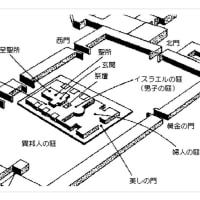137篇 知っておられる
1.文脈と背景
1節、「バビロンの川のほとり、そこに私たちはすわり」とあります。この詩は、明らかにバビロン捕囚で、捕虜としてバビロンに強制移住させられたイスラエル人の経験を語っています。ただ実際の作詞年代はわかっていません。というのも詩人は、捕囚帰還後に、そこで起こった出来事を回想して書いたとも考えられるからです。
ともあれ、この詩は、かつての戦争の傷跡、痛みを感じさせるものです。終いには憤りすらかきたててくるところがあります。つまり詩篇の中では「のろいの詩篇」と分類されるものです。
詩人は、捕虜として連れ去られた先のバビロンで、古代イスラエルの歌を歌わせられるのです。余興で歌えと。こうした経験は、かつて日本がアジアの国を占領した時にもあったことかもしれません。あるいは逆に日本が戦争に負けて、異国に抑留された時にもあったことかもしれません。日本人が戦争をした、という歴史はあります。また日本人がいかに勇敢に戦ったか、戦争を美化する大衆文化もあります。しかし、戦争で他国を蹂躙した、他国民を虐待したということは、なかなか語られないものです。ただ、アジアの国々を旅すれば、いたるところに当時の出来事を記録する記念博物館があり、かつて日本がアジアの国の人々にした蛮行は明らかです。ともあれ、古代イスラエルの人々も、戦勝国バビロンに、神を讃える歌を歌うように求められ、屈辱を強いられるような経験をしたのです。彼らが歌う歌は、自然の美しさを、人間の情愛を歌う歌ではなく、自分たちが全能と考える神の栄光を歌う歌です。敵国に征服され、奴隷とされている状況で、全能の神を賛美する歌を歌わせられるのです。お前たちは、神を全能だ、神は素晴らしいと言うが、その神がお前たちを救ってくれたのか、と笑いものにされる状況です。しかし、神がイスラエルを救えなかったのではありません。それはイスラエルが神に不従順であった結果、神のさばきでした。神が否定され、自分たちの愚かさも思い知らされる、そのような屈辱感の中から、詩人は毒を吐き出すわけです。「幸いなことよ、おまえ(敵)の幼子たちを捕らえ、岩に打ち付ける人は」(9節)。暴言に等しいことばですが、その心の悲しみ、戸惑いはよく理解できることでしょう。
2.感じてくださる神
さてこのような人間の激しい感情の吐き出しがあからさまに記録されるのは、神がそれをよしとされるよりも、その深さを神が感じておられることを証するためでしょう。つまり、詩人は、毒を吐きながら、その痛みを神が感じていることを理解したというわけです。彼らの恥を、憤りを、神がその深さを受け止められる方であることを感じていたのです。
黙示録の七つの教会へのメッセージを読むとなるほどと思うことがあります。エペソの教会に対して、イエスは、「わたしは、あなたの行い、あなたの労苦と忍耐を知っている」(2:2)と語られました。しかし原文は「知っている!あなたの行いと、労苦と忍耐を」という語順になっています。つまり神が知っている事実に強調があります。同様にイエスは、スミルナの教会に対しても「知っている!あなたの苦しみと貧しさを!」と言います。そしてペルガモの教会に対しても「知っている、あなたの置かれた環境を!」と言います。神は、私たちの行いも、苦しみも貧しさも、そして置かれた状況も、すべて知っている!わかっている!というわけです。
この詩は、単純に読めば、最後は尻切れトンボで、憤りをかきたてて終わっている感じがします。しかし、それはむき出しの祈りの、究極の頂点を示すものでしょう。詩人は憤りの頂点において、悟りを与えられているのです。あたかも、ハンナが一心不乱に祈る中で、気づきを得て「その顔は、もはや以前のようではなかった」(1サムエル1:18)となったことに等しい状況です。人の悲しみ、怒り、憤りを、その深みにおいて共感される神を、詩人は悟った、というべきでしょう。ただひたすら、神に自分の気持ちを打ち明けるべきことを教えられます。毒を吐くならば、人ではなく神に吐くべきです。いつもいつも人に吐き出す、そこに成長はありません。人の心の深みに共感される神がおられることを覚えたいものです。では今日もよき一日となりますように祈ります。
<クイズコーナー>
最初に、昨日のクイズです。バシャンの王オグは、何人であったでしょうか?①アンモン人、②エモリ人、③モアブ人。答えは②エモリ人(民数21:33)でした。では、今日の聖書クイズです。バビロンという言葉は、新約聖書では、何の象徴として用いられることがあるでしょうか。①ローマ、②エペソ、③コリント、答えはまた明日。では今日もよき一日となりますように祈ります。
Psalm 137: He knows
1. context and background
Verse 1, "By the rivers of Babylon, there we shall sit." This psalm clearly speaks of the experience of the Israelites during the Babylonian captivity, when they were forced to emigrate to Babylon as captives. However, the actual date of the poem is not known, since it is thought that the poet may have written it after his return from captivity, recalling the events that took place there.
In any case, the poem evokes the scars and pain of the war. The psalmist may have been recalling the events that took place there after his return from captivity. In other words, it is what is classified as a "Psalm of Torment" in the Psalms.
The psalmist is taken captive to Babylon, where he is made to sing an ancient Israelite song. He is told to sing them as an entertainment. This experience may have happened in the past when Japan occupied Asian countries. Or, conversely, it may have happened when Japan lost a war and was interned in a foreign country. There is a history of Japanese wars. There is also a popular culture that glorifies war and how bravely the Japanese fought. However, it is hard to talk about how the war violated other countries and abused other peoples. However, if you travel to Asian countries, you will find memorial museums everywhere that document the events of that time, and the barbaric acts that Japan once committed against the peoples of the Asian countries are obvious. At any rate, the people of ancient Israel also experienced humiliation when they were asked to sing songs of praise to God by the victorious nation of Babylon. The songs they sang were not songs of the beauty of nature or of human affection, but songs of the glory of God, whom they considered omnipotent. They are forced to sing songs of praise to God Almighty in a situation where they are conquered and enslaved by an enemy nation. You say that God is almighty and that God is wonderful, but then you are laughed at and asked if God has saved you. But it is not that God failed to save Israel. It was God's judgment as a result of Israel's disobedience to Him. It is out of this humiliation, in which God is denied and they are reminded of their own foolishness, that the psalmist spits out his venom. Blessed is the man who seizes your (the enemy's) infants and smites them on the rocks" (v. 9). It is a rhetorical statement, but we can understand the sorrow and confusion in the heart of the psalmist.
2. God Who Feels
The reason such an outpouring of human emotion is recorded so blatantly is probably to testify that God feels the depth of it more than He condones it. In other words, the psalmist understood that God felt their pain as they vomited their venom. He felt their shame, their indignation, and that God is the one who can take the depth of it.
I see what I mean when I read the message to the seven churches in Revelation. To the church in Ephesus, Jesus said, "I know your works, your toil and your patience" (2:2). But the original text reads, "I know! Thy works, and thy toil and thy patience" is the order of the words. In other words, the emphasis is on the fact that God knows. Similarly, Jesus said to the church in Smyrna, "I know! Your suffering and poverty!" And to the church in Pergamum, "I know your circumstances! God is counting all our deeds, our suffering, our poverty, and our circumstances! He knows! He knows!
If read simply, this psalm seems to end on a sour note, and is angry. But it does mark the ultimate culmination of bare prayer. The poet is given enlightenment at the peak of his indignation. It is as if Hannah, in her single-minded prayer, has come to a realization and "her face was no longer as it had been" (1 Samuel 1:18). It should be said that the psalmist realized a God who is sympathetic to human grief, anger, and resentment in their depths. He is taught that he should simply confide his feelings to God. If you are going to spew venom, you should spew it to God, not to others. There is no growth in always spitting it out to others. We should remember that there is a God who sympathizes with the depths of our hearts. I pray that today will be another good day.
<Quiz Corner
First, yesterday's quiz. How many people were Og, king of Bashan? (1) Ammonites, (2) Emorites, and (3) Moabites. The answer was (2) an Emorite (Numbers 21:33). Now, here is today's Bible quiz. The word Babylon is sometimes used in the New Testament as a symbol for what? (1) Rome, (2) Ephesus, (3) Corinth, and the answer will be given tomorrow. Well, I pray that you have a good day today.
















